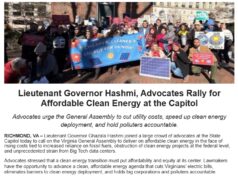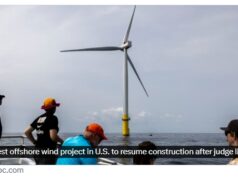Although it certainly marked an important breakthrough and made progress in many ways, one of the Virginia Clean Economy Act’s big – one could argue fatal – flaws was its unacceptable (and baffling) lack of ambition in terms of its timeline to reach 100% clean electricity. As I wrote a couple weeks ago:
Currently, for instance, VCEA requires “Dominion Energy Virginia to be 100 percent carbon-free by 2045 and Appalachian Power to be 100 percent carbon-free by 2050.” Wait, what??? This is going to take until 2045 and 2050? As in, 24 years and 29 years from now?!? To put it mildly, that seems like an awfully long time – FAR too long! – given the urgency of the climate crisis and the economics of clean energy vs. fossil fuels.
I noted in that article that a fascinating new analysis by independent think tank “RethinkX” finds that, in fact, “governments can and should recalibrate their emissions targets and bring forward their policy and planning timelines for achieving 100% clean energy into the 2030s from the 2050s and 2040s (which are based on flawed [Levelized Cost of Electricity] LCOE estimates).” (That’s right, the 2030s — or 10-20 years earlier than what VCEA unambitiously requires!).
So, as you check out former Gov. Terry McAuliffe’s new plan “to tackle climate change and secure Virginia’s clean energy future by 2035” (see below), it’s important to understand that not only is this goal highly realistic and absolutely necessary from both environmental and economic points of view, it underscores how absurd it is that VCEA set 2045-2050 as its goal, when…and let me emphasize this…*clean energy TODAY is the most economical source of new electricity, and that cost advantage over fossil fuels is only going to get greater and greater as the years go by!*
Specifically on McAuliffe’s plan, the good news is the increased ambition (in line with the Biden administration) from the decade-or-worse-too-slow VCEA (and yes, I argued this at the time it was being considered, and was brushed off with no coherent or sensible explanation; grrrrr…). It’s also very good to see an emphasis in this plan on energy efficiency, although I’d argue – as always – that it should be even *more* aggressive, given that energy efficiency is in so many ways the biggest “bang” for the energy “buck” – namely, the energy you never have to produce in the first place, and the pollution you never have to spew out in the first place. As for distributed power, such as rooftop solar, Virginia needs to do a LOT more on that front, for a number of reasons, and should heavily incentivize homeowners to move in that direction (as well towards far, far more efficient homes). And how about setting a standard that all new buildings in Virginia need to be as close to “net zero” as possible, while also mandating energy efficiency retrofits for existing buildings? Also, how about tackling land use patterns (e.g., sprawl development), which contribute heavily to fossil fuel dependence and greenhouse gas emissions?
The bottom line, as Greta Thunberg has said many times, we need to treat the climate crisis AS A CRISIS, and stop acting like we have all the time in the world. Because we don’t. We also should treat this crisis as an opportunity, of course, to build a far more equitable, sustainable economy that works for everyone. On those fronts, McAuliffe’s new plan appears to be a step in the right direction, certainly in contrast to the bizarrely weak and unambitious VCEA, and that’s good to see. Still, the fact is, the climate crisis calls for even more urgency and ambition than almost anybody’s showing at this point, and that’s simply not going to cut it.
P.S. Note: it goes without saying that climate-science-denying/fossil-fuel-industry-loving Virginia Republicans are worse than worthless on this entire issue, and that they should be eliminated from consideration for holding power unless/until they DO get serious on the #1 existential threat facing humanity.
Terry McAuliffe Releases Bold Plan to Tackle Climate Change and Secure Virginia’s Clean Energy Future by 2035
Bold New Plan Will Create Good Clean Energy Jobs, Strengthen Resilience Against Climate Threats, and Address Environmental Inequities
As Virginia’s 72nd Governor, Terry Grew Solar Jobs by 65% in 2016, Expanded Solar Production Nearly 8,000%, and Secured $120 Million HUD Grant to Mitigate Flooding in Black and Brown Communities in Norfolk
MCLEAN, VA – Terry McAuliffe today released his bold plan to tackle climate change and secure Virginia’s clean energy future by setting an aggressive target to reach 100% clean energy by 2035, aligning Virginia with President Biden’s climate goals and efforts to pass a federal climate and infrastructure bill this year. As governor, Terry will work to create good clean energy jobs, strengthen the Commonwealth’s resilience against climate threats, and address environmental inequities. Terry released his plan, Boldly Fighting the Threat of Climate Change and Building Virginia’s Clean Energy Future, during a conversation with Del. Shelly Simonds (Newport News) and Del. Alex Askew (Virginia Beach) on the impacts of climate change in Hampton Roads.
Hampton Roads, home to military assets vital to America’s national security, is emblematic of the growing threat of climate change, as it faces increasingly severe storms, sinking land, and sea levels rising at some of the highest rates in the world. As Virginia’s next governor, Terry will work closely with the Biden administration, Virginia’s localities and private sector partners to build resiliency and protect against the effects of climate change. He will leverage federal funds to invest in sea-level rise solutions that protect communities and national security interests in coastal Virginia. And he will secure federal funds to conduct a full coastal study to identify the risks and needs in the region to prepare for emergencies, develop climate resilient shelters and make comprehensive disaster plans. Terry will also work to restore Virginia’s aquatic ecosystems and increase funding for innovative projects like Hampton Roads’ Sustainable Water Infrastructure for Tomorrow (SWIFT) program, which is projected to save the region $2 billion.
“We know that climate change and pollution burdens communities of color the most with disproportionate exposure to environmental hazards, extreme heat and pollutants — and these communities are less prepared to adapt to a changing climate and its destructive impacts. Virginia needs bold, proven leadership that can bring us out of this climate crisis and into a stronger, more equitable future. That’s why I’m so proud to support Terry and his plan,” said Delegate Alex Askew (Virginia Beach). “During his administration, Terry aggressively pursued and secured a $120 million grant to mitigate flooding in two predominantly Black communities in Hampton Roads. He’s done it before, and I know he will fight for our communities again as Virginia’s next governor.”
In addition to protecting Virginians from the dangerous effects of climate change, Terry’s plan will ensure a just transition to clean energy that will create jobs, lower utility bills, and build a clean economy for all Virginians, particularly communities of color that too often have been left out and left behind. He will focus on equitably increasing access to clean forms of energy and transportation through expanded Power Purchase Agreements for rooftop solar and significant investments in electric vehicle charging infrastructure. Additionally, Terry will modernize Virginia’s electric grid to create efficiencies, quickly identify outages so that power can be restored quickly after disruptions, and provide long-term cost savings for residents.
“The threat of climate change to Hampton Roads is growing more serious by the day, and each day we fail to act, our residents suffer. We need strong leadership from the highest levels of government to tackle this crisis, and I know Terry will work tirelessly to get this done,” said Delegate Shelly Simonds (Newport News). “Terry championed these issues when he was governor and boldly pursued policies to protect Virginia’s coast against the effects of climate change, even when Republicans fought against his efforts. I know Terry will protect coastal Virginians in cities like Hampton Roads whose future depends on it, and he will lead our transition to a 100% clean energy future and the good jobs that come with it.”
Terry will lead Virginia’s transition to 100% clean energy by investing in energy efficiency, restructuring Virginia’s regulatory structure to protect consumers and incentivize the transition, and decarbonizing Virginia’s transportation sector. More than 100,000 Virginians currently work in advanced energy jobs, and the transition to a clean energy future is anticipated to create 13,000 new jobs per year. Terry will continue to build a clean energy workforce by collaborating with Virginia’s institutions of higher education and clean energy industries to expand capacity for relevant courses, develop a hands-on curriculum, and expand apprenticeship and pre-apprenticeship programs that provide students with the skills required for these well-paying jobs. As governor, he will also prioritize re-training for the 24,000 Virginians who currently work in predominantly rural fossil fuel industries so they can access the clean energy jobs of the future.
“Climate change is one of the greatest threats to the future of our Commonwealth and our communities, yet Republicans continue to deny its impact, putting Virginians’ lives and futures at risk. Securing our clean energy future is critical to securing our future, and I promise you that Virginia will lead the nation in tackling climate change and transitioning to clean energy,” said Terry McAuliffe. “We’re going to get Virginia to 100% clean energy by 2035 by partnering with President Biden and investing critical federal dollars, secure our vital coastal communities like Hampton Roads, tackle inequities and environmental racism, and build a brighter future for all Virginians.”
As Virginia’s 72nd Governor, Terry fought to address the threat to Virginia posed by climate change against a Republican-controlled legislature that viewed inaction and obstruction as its best solution. He appointed the state’s first Chief Resilience Officer and created the Climate Change and Resiliency Update Commission. Terry also secured a $120 million HUD grant to mitigate flooding in two predominantly Black neighborhoods in Norfolk. As governor, Terry secured a $50 million settlement from DuPont over mercury spills that was used to fund statewide projects restoring and protecting natural resources and the environment. When former President Trump withdrew the United States from the Paris Climate Agreement, Terry joined the U.S. Climate Alliance and committed to upholding the agreement in Virginia. Terry also grew solar jobs by 65% in 2016 and expanded solar production by nearly 8,000% during his administration, an effort that included Virginia’s first grid-scale solar project that was also the largest in the mid-Atlantic.
Since launching his campaign in December, Terry has released big, bold plans to strengthen Virginia’s education system and dramatically increase teacher pay, help secure Virginia’s economic recovery from COVID-19, reform our criminal justice system to create a more equitable Virginia, ensure Virginians have access to regular nutritious meals, address the broken, predatory system of prescription drug pricing, boldly confront the gun violence epidemic, make Virginia the best state in the nation for Science, Technology, Engineering, Mathematics and Healthcare (STEM-H) and computer science education, tackle the housing crisis in the Commonwealth and invest in Virginia’s workforce to create a more equitable post-COVID economy, and ensure Virginians have access to high-quality, affordable health care.


![VA DEQ: “pollution from data centers currently makes up a very small but growing percentage of the [NoVA] region’s most harmful air emissions, including CO, NOx and PM2.5”](https://bluevirginia.us/wp-content/uploads/2026/01/noxdatacenters-238x178.jpg)






![Analysis by Sam Shirazi on VA GOP’s Attempts to Kill the Redistricting Amendment in the Courts: If VA Supreme Court “rule[s] for the Republicans, that would be a pretty big shocker”](https://bluevirginia.us/wp-content/uploads/2026/01/shirazilawsuit-100x75.jpg)
![VA DEQ: “pollution from data centers currently makes up a very small but growing percentage of the [NoVA] region’s most harmful air emissions, including CO, NOx and PM2.5”](https://bluevirginia.us/wp-content/uploads/2026/01/noxdatacenters-100x75.jpg)